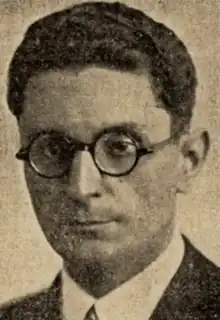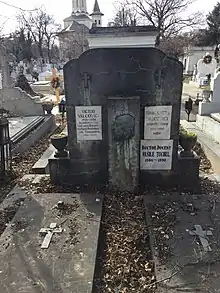Victor Vâlcovici | |
|---|---|
 Vâlcovici in the 1930s | |
| Born | September 21, 1885 |
| Died | 21 June 1970 (aged 84) |
| Resting place | Bellu Cemetery, Bucharest |
| Education | Nicolae Bălcescu High School |
| Alma mater | University of Bucharest University of Göttingen |
| Scientific career | |
| Fields | Mathematics, Mechanics |
| Institutions | University of Iași Polytechnic School of Timișoara University of Bucharest |
| Thesis | Ueber die diskontinuierliche Flussigkeitsbewegungen mit zwei freien Strahlen (1913) |
| Doctoral advisor | Ludwig Prandtl |
| Minister of Public Works and Communications | |
| In office April 18, 1931 – June 5, 1932 | |
| Prime Minister | Nicolae Iorga |
| Preceded by | Ion Răducanu |
| Succeeded by | Gheorghe Mironescu |
| Minister of Justice | |
| In office January 7 – January 9, 1932 | |
| Prime Minister | Nicolae Iorga |
| Preceded by | Constantin Hamangiu |
| Succeeded by | Valer Pop |
.png.webp)

Victor Vâlcovici (21 September [O.S. 9 September] 1885 – 21 June 1970) was a Romanian mechanician and mathematician.
Biography
Born into a modest family in Galați, he graduated first in his class in 1904 from Nicolae Bălcescu High School in Brăila. Entering the University of Bucharest on a scholarship, he attended its faculty of sciences, where he had as teachers Spiru Haret and Gheorghe Țițeica.[1] After graduating in 1907 with a degree in mathematics, he taught high school for two years before leaving for University of Göttingen on another scholarship to pursue a doctorate in mathematics. He wrote his thesis under the direction of Ludwig Prandtl and defended it in 1913; the thesis, titled Ueber die diskontinuierliche Flussigkeitsbewegungen mit zwei freien Strahlen (Discontinuous flow of liquids in two free dimensions),[2][3][4] amplified upon the work of Bernhard Riemann.[5]
He was subsequently named assistant professor of mechanics at the University of Iași, rising to full professor in 1918.[6] In 1921, he became rector of the Polytechnic School of Timișoara. There, he was also professor of rational mechanics and founded a laboratory dedicated to the field.[5] During his nine years as rector, he worked to place the recently founded university on a solid foundation.[6] From 1930 until retiring in 1962, he taught experimental mechanics at the University of Bucharest.[5] In the government of Nicolae Iorga, he served as Minister of Public Works from 1931 to 1932. During this time, he introduced a modern road network that featured paved highways.[5][6] In 1936 he gave an invited talk at the International Congress of Mathematicians in Oslo, with title Sur le sillage derrière un obstacle circulaire (In the wake of a circular obstacle).[7]
Elected a corresponding member of the Romanian Academy in 1936,[8] he was stripped of his membership by the new communist regime in 1948,[9]: 123 but made a titular member of the Romanian Academy in 1965.[10] His numerous articles on theoretical and applied mechanics covered topics such as the principles of variational mechanics, the mechanics of ideal fluid flow, the theory of elasticity and astronomy.[5]
He died in 1970 in Bucharest, and was buried in the city's Bellu Cemetery. Streets have been named after Victor Vâlcovici in Brăila, Galați, and Timișoara; a school in Galați also bears his name.
Books
- Vâlcovici, Victor (1958). Une extension des liaisons non holonomes et des principes variationnels (in French). De Gruyter. doi:10.1515/9783112498545. ISBN 978-3-11-249854-5. MR 0090218. S2CID 118604371.
- Vâlcovici, Victor (1971). Mecanica fluidelor și teoria elasticității (in Romanian). București: Editura Academiei Republicii Socialiste România. OCLC 886523167.
Notes
- ↑ Predescu, D.C. (May 23, 2013). "Gălățeni care au uimit lumea – Victor Vâlcovici". Viața Liberă (in Romanian). Retrieved February 16, 2022.
- ↑ Victor Vâlcovici at the Mathematics Genealogy Project
- ↑ Otlăcan, pp. 125–6
- ↑ Vâlcovici, Victor (1913), Über diskontinuierliche Flüssigkeitsbewegungen mit zwei freien Strahlen (in German), Göttingen: Dieterich, JFM 44.0859.01
- 1 2 3 4 5 Hager, p. 1361
- 1 2 3 Otlăcan, p. 127
- ↑ Comptes rendus du Congrès International des Mathématiciens: Oslo, 14–18 julliet 1936 (PDF), Oslo: A.W. Brøggers, 1937, p. 250, OCLC 1404131
- ↑ Otlăcan, p. 126, 127
- ↑ Otiman, Păun Ion (December 2013). "1948–Anul imensei jertfe a Academiei Române" (PDF). Akademos (in Romanian). 4 (31): 115–124.
- ↑ "Membrii Academiei Române din 1866 până în prezent" (in Romanian). Romanian Academy.
References
- Willi Hager, Hydraulicians in Europe (1800–2000), vol. 2. CRC Press, Boca Raton, Florida, 2009. ISBN 978-1-4665-5498-6
- (in Romanian) Eufrosina Otlăcan, "Victor Vâlcovici (1885–1970) – savant și desăvârșit pedagog", NOEMA, vol. VI, 2007, pp. 124–29
External links
- "Valcovici, Victor (1885–1970)". www.dmg-lib.org. Retrieved February 16, 2022.